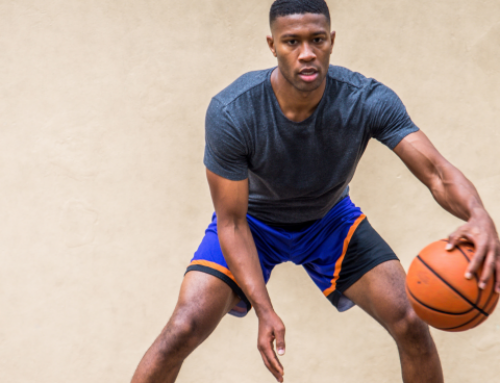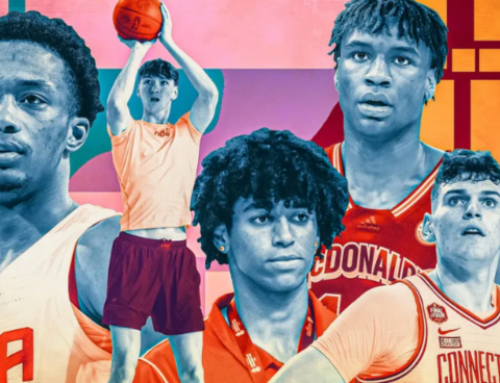Majok Deng Grew Up in Worn-Torn South Sudan. Now He’s Preparing to Play Division-1 Basketball.
We arrived at a suburban Phoenix high school on a steamy summer morning in Arizona to begin our video shoot with Majok Deng (pronounced Ma-Juke), one of Arizona’s top high school basketball prospects. Deng, who has already received offers from multiple Division-I schools, was hard at work honing his dribbling and shooting skills with his coach Jeff Becker, who is also the program director at Powerhouse Hoops.
It took all of about 60 seconds watching the 6-foot-5 small forward to conclude this kid’s got game. He moved quickly and explosively, worked relentlessly to perfect his jump shot form different areas of the court and flashed the occasional dunk. Later, he dunked over me, which was equally impressive and terrifying consider I’m 6-foot-2.
No doubt, Majok is an impressive basketball player, and we suspect he will excel in Division-1 ball. But after spending a day with Majok, it was apparent that he’s an even more impressive person who has had an incredible journey to get to where he is today.
Life in South Sudan
Majok lived in South Sudan—considered one of the most dangerous places in the world—until he was 6 years old. The country has been in a state of civil war since 2013 and was marred by continuous conflict before its independence from Sudan in 2011.
There have been countless atrocities in the region, including war crimes, genocide and thousands of children forced to become soldiers, in addition to humanitarian issues, such as a lack of food and clean water, and an abundance of disease. It’s estimated that one to two million people died in the second Sudanese Civil War.
Majok has bittersweet feelings toward his time in South Sudan. He talks fondly about the beauty of the African country and his love for traditional South Sudanese food. He recalls spending time with his brother—they were once thwarted from gathering an animal they hunted because a lion beat them to it. He also talks about playing lots of soccer, which was his favorite sport before basketball.
“It’s a beautiful place, but we don’t think it’s beautiful because of all of the stuff going on around there,” he says.
Danger came in multiple forms. A simple game of soccer was played under close supervision in a backyard for fear of being abducted and forced to become a child soldier—these games were also often interrupted by gunfire. War could break out at any moment. Hunger was a consistent issue. And although Majok tells the story of the lion with humor, let us remind you that he was hunting as a young child and was evading one of the fiercest animals on the planet.
These experiences and the responsibilities that came along with them forced Majok to grow up fast. He had no other option.
“Kids could start drinking at the age of 11 years old, working days at the age of 9 to help their families,” says Majok. “You gotta really mature.”
The situation in South Sudan became so dire that Majok, his mother and two brothers made the trek to a Kenyan refugee camp—his older brother, father and grandmother stayed behind.
The Deng family lived in the refugee camp for a year, anxiously waiting for an opportunity to leave for the United States. Majok described the refugee camp as unimaginably crowded and filled with disease and sickness. Food was scarce, and danger lurked—although they were safe from the threat of war.
Only healthy individuals were allowed into the United States, so the Dengs feared they might contract an illness while in camp that would ruin their chances.
Finally, their prayers were answered.
“My mom was originally a midwife. She used to help deliver babies,” he says. “A lady came up to her and asked her if she’d like to continue doing this job in America. Two weeks later, I find myself in a plane to come to America.”
The Next Chapter
Although America sounded great in theory, it wasn’t all sunshine and rainbows. Majok had never left the hot, tropical climate of South Sudan. He was then abruptly put on an airplane—he had never flown—and transported to Chicago in the middle of winter.
“Landing in America, I was really scared. I saw different colored people that I’ve never seen in my life. I didn’t know any English at all,” he recalls. “It brought me to tears because I wanted to go back home. It didn’t feel like home for a while.”
When asked about his first experience with American food, he remembers having one of the worst stomach aches of his life.
The Dengs settle into the Tucson area. Majok’s mother was unable to continue her practice as a midwife in the United States but secured a job in a local grocery store to support the family. They had no contact with their family in South Sudan, and were even unsure of their location—they finally made contact with Majok’s father and brother three years later only to learn that Majok’s grandmother had become a casualty of war and passed away.
Majok’s first months in the United States weren’t easy. He struggled with English, and making friends was a challenge due to the language and culture barrier.
“I wanted to make friends right away, but it was hard to answer them because my accent was so thick. They would start laughing when I started talking, so I would just stop,” he says. “If people were playing soccer on the field, I would just go and ask if I could be on someone’s team. There were kids who didn’t laugh right away when I said something.”
After about six months, it started to feel like home.
A Love for Basketball
“The first time I picked up a basketball was behind a church,” says Deng. “My brother used to always go over there and play, and I’d just follow him and start shooting baskets.”
Deng was a quick study. His athleticism and tall frame made him a natural at the unfamiliar game.
“I started picking it up so fast that I started to dunk in seventh grade. When I first dunked in front of a huge crowd, it was at the [University of Arizona],” he recalls. “Right when I went for the dunk and made it, I was so amazed. Everyone was cheering on their feet, saying my name on the intercom: ‘That was Majok Deng!’ I’ll remember that forever.”
Majok now attends Salpointe Catholic and is known for playing the game with a relentless motor and approaches every play like it’s his last. We witnessed him go through a strength and conditioning workout with the same ferocious intensity.
Throughout this process, coach Becker has been right along with him. With Majok’s father still awaiting his opportunity to rejoin his family, Becker and Majok have developed a sort of father-son relationship.
“I’ve known Majok now for about four years. I feel like the last few years, we’ve gotten really close. Without a father figure in the picture right now, there are a few guys who don’t look at ourselves as coaches, we look at ourselves as mentors, role models, father figures toward Majok,” says Becker. “A lot of people are like, ‘You’re helping Majok become a better person.’ Really it’s the other way around. Majok is the type of kid who changes your life more than you change his.”
The qualities that Majok exhibits both on and off the court have helped him earn scholarship opportunities at several top Division-I schools—he received an offer to UCLA while we were spending the day with him, and has since had an unofficial visit at Duke.

Majok and Coach K during his Duke visit.
“I have a long way to go as a basketball player. But there are so many opportunities that I’ve got to be in that I would’ve never gotten if I didn’t get involved in basketball,” he says. “But other people know me because of my personality around school and because of the way I carry myself.”
Basketball may continue to afford Majok unexpected opportunities. He hopes to become the first person in his family to go to college, and he dreams of playing in the NBA and supporting his family. Ultimately he plans to visit his home in South Sudan to give back to the community and share the lessons he learned from his extraordinary life.
READ MORE:
- Kevin Love’s In-Season Basketball Workout
- How D’Angelo Russell Got Addicted to Hard Work
- How to Finish at the Rim Like Kyrie Irving
RECOMMENDED FOR YOU
MOST POPULAR
Majok Deng Grew Up in Worn-Torn South Sudan. Now He’s Preparing to Play Division-1 Basketball.
We arrived at a suburban Phoenix high school on a steamy summer morning in Arizona to begin our video shoot with Majok Deng (pronounced Ma-Juke), one of Arizona’s top high school basketball prospects. Deng, who has already received offers from multiple Division-I schools, was hard at work honing his dribbling and shooting skills with his coach Jeff Becker, who is also the program director at Powerhouse Hoops.
It took all of about 60 seconds watching the 6-foot-5 small forward to conclude this kid’s got game. He moved quickly and explosively, worked relentlessly to perfect his jump shot form different areas of the court and flashed the occasional dunk. Later, he dunked over me, which was equally impressive and terrifying consider I’m 6-foot-2.
No doubt, Majok is an impressive basketball player, and we suspect he will excel in Division-1 ball. But after spending a day with Majok, it was apparent that he’s an even more impressive person who has had an incredible journey to get to where he is today.
Life in South Sudan
Majok lived in South Sudan—considered one of the most dangerous places in the world—until he was 6 years old. The country has been in a state of civil war since 2013 and was marred by continuous conflict before its independence from Sudan in 2011.
There have been countless atrocities in the region, including war crimes, genocide and thousands of children forced to become soldiers, in addition to humanitarian issues, such as a lack of food and clean water, and an abundance of disease. It’s estimated that one to two million people died in the second Sudanese Civil War.
Majok has bittersweet feelings toward his time in South Sudan. He talks fondly about the beauty of the African country and his love for traditional South Sudanese food. He recalls spending time with his brother—they were once thwarted from gathering an animal they hunted because a lion beat them to it. He also talks about playing lots of soccer, which was his favorite sport before basketball.
“It’s a beautiful place, but we don’t think it’s beautiful because of all of the stuff going on around there,” he says.
Danger came in multiple forms. A simple game of soccer was played under close supervision in a backyard for fear of being abducted and forced to become a child soldier—these games were also often interrupted by gunfire. War could break out at any moment. Hunger was a consistent issue. And although Majok tells the story of the lion with humor, let us remind you that he was hunting as a young child and was evading one of the fiercest animals on the planet.
These experiences and the responsibilities that came along with them forced Majok to grow up fast. He had no other option.
“Kids could start drinking at the age of 11 years old, working days at the age of 9 to help their families,” says Majok. “You gotta really mature.”
The situation in South Sudan became so dire that Majok, his mother and two brothers made the trek to a Kenyan refugee camp—his older brother, father and grandmother stayed behind.
The Deng family lived in the refugee camp for a year, anxiously waiting for an opportunity to leave for the United States. Majok described the refugee camp as unimaginably crowded and filled with disease and sickness. Food was scarce, and danger lurked—although they were safe from the threat of war.
Only healthy individuals were allowed into the United States, so the Dengs feared they might contract an illness while in camp that would ruin their chances.
Finally, their prayers were answered.
“My mom was originally a midwife. She used to help deliver babies,” he says. “A lady came up to her and asked her if she’d like to continue doing this job in America. Two weeks later, I find myself in a plane to come to America.”
The Next Chapter
Although America sounded great in theory, it wasn’t all sunshine and rainbows. Majok had never left the hot, tropical climate of South Sudan. He was then abruptly put on an airplane—he had never flown—and transported to Chicago in the middle of winter.
“Landing in America, I was really scared. I saw different colored people that I’ve never seen in my life. I didn’t know any English at all,” he recalls. “It brought me to tears because I wanted to go back home. It didn’t feel like home for a while.”
When asked about his first experience with American food, he remembers having one of the worst stomach aches of his life.
The Dengs settle into the Tucson area. Majok’s mother was unable to continue her practice as a midwife in the United States but secured a job in a local grocery store to support the family. They had no contact with their family in South Sudan, and were even unsure of their location—they finally made contact with Majok’s father and brother three years later only to learn that Majok’s grandmother had become a casualty of war and passed away.
Majok’s first months in the United States weren’t easy. He struggled with English, and making friends was a challenge due to the language and culture barrier.
“I wanted to make friends right away, but it was hard to answer them because my accent was so thick. They would start laughing when I started talking, so I would just stop,” he says. “If people were playing soccer on the field, I would just go and ask if I could be on someone’s team. There were kids who didn’t laugh right away when I said something.”
After about six months, it started to feel like home.
A Love for Basketball
“The first time I picked up a basketball was behind a church,” says Deng. “My brother used to always go over there and play, and I’d just follow him and start shooting baskets.”
Deng was a quick study. His athleticism and tall frame made him a natural at the unfamiliar game.
“I started picking it up so fast that I started to dunk in seventh grade. When I first dunked in front of a huge crowd, it was at the [University of Arizona],” he recalls. “Right when I went for the dunk and made it, I was so amazed. Everyone was cheering on their feet, saying my name on the intercom: ‘That was Majok Deng!’ I’ll remember that forever.”
Majok now attends Salpointe Catholic and is known for playing the game with a relentless motor and approaches every play like it’s his last. We witnessed him go through a strength and conditioning workout with the same ferocious intensity.
Throughout this process, coach Becker has been right along with him. With Majok’s father still awaiting his opportunity to rejoin his family, Becker and Majok have developed a sort of father-son relationship.
“I’ve known Majok now for about four years. I feel like the last few years, we’ve gotten really close. Without a father figure in the picture right now, there are a few guys who don’t look at ourselves as coaches, we look at ourselves as mentors, role models, father figures toward Majok,” says Becker. “A lot of people are like, ‘You’re helping Majok become a better person.’ Really it’s the other way around. Majok is the type of kid who changes your life more than you change his.”
The qualities that Majok exhibits both on and off the court have helped him earn scholarship opportunities at several top Division-I schools—he received an offer to UCLA while we were spending the day with him, and has since had an unofficial visit at Duke.

Majok and Coach K during his Duke visit.
“I have a long way to go as a basketball player. But there are so many opportunities that I’ve got to be in that I would’ve never gotten if I didn’t get involved in basketball,” he says. “But other people know me because of my personality around school and because of the way I carry myself.”
Basketball may continue to afford Majok unexpected opportunities. He hopes to become the first person in his family to go to college, and he dreams of playing in the NBA and supporting his family. Ultimately he plans to visit his home in South Sudan to give back to the community and share the lessons he learned from his extraordinary life.
READ MORE:
- Kevin Love’s In-Season Basketball Workout
- How D’Angelo Russell Got Addicted to Hard Work
- How to Finish at the Rim Like Kyrie Irving
















